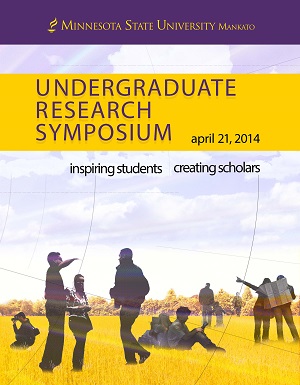Location
CSU Ballroom
Start Date
21-4-2014 10:00 AM
End Date
21-4-2014 11:30 AM
Student's Major
Chemistry and Geology
Student's College
Science, Engineering and Technology
Mentor's Name
Theresa Salerno
Mentor's Email Address
theresa.salerno@mnsu.edu
Mentor's Department
Chemistry and Geology
Mentor's College
Science, Engineering and Technology
Description
Normal abundant dietary sugars such as fructose and glucose can contribute to hypertension and other health issues. To avoid these health complications, many individuals use artificial sweeteners. An equivalent intake of some artificial sweeteners also can lead to hypertension. However, Stevia, a sweetener that is isolated from a Paraguayan plant, was shown in relevant literature to decrease blood pressure in both rat specimens and humans. The general purpose of this research project was to study the effect of Stevia and glucose on the expression of two key components of the renin-angiotensin-aldosterone system (RAAS): prorenin receptor (PRR) and angiotensin receptor type 1 (AT1). Increased expression of renin and angiotensin can lead to vasoconstriction and systemic hypertension. Their effects are mediated by their binding to PRR and AT1. Therefore, decreases in the expression of these receptor proteins can result in lowered blood pressure. Rats were fed diets supplemented with glucose, saccharin, or Stevia over a six-week period and the kidneys were obtained. qPCR designs were developed to measure the relative amounts of PRR receptor and AT1 receptor. The methods had efficiencies greater than 97% and gave reproducible results. Then the developed methods were used to measure the expression of AT1 and PRR in the different rat kidney samples. Preliminary results with a small sample group suggest that glucose might cause an increase in the expression of both AT1 and PRR compared to the standard diet. Further experimentation will also document the effects of short-term exposure to Stevia in the diet.
Creative Commons License

This work is licensed under a Creative Commons Attribution 4.0 International License.
Effect of Artificial Sweeteners on the Renin-Angiotensin System in Rats
CSU Ballroom
Normal abundant dietary sugars such as fructose and glucose can contribute to hypertension and other health issues. To avoid these health complications, many individuals use artificial sweeteners. An equivalent intake of some artificial sweeteners also can lead to hypertension. However, Stevia, a sweetener that is isolated from a Paraguayan plant, was shown in relevant literature to decrease blood pressure in both rat specimens and humans. The general purpose of this research project was to study the effect of Stevia and glucose on the expression of two key components of the renin-angiotensin-aldosterone system (RAAS): prorenin receptor (PRR) and angiotensin receptor type 1 (AT1). Increased expression of renin and angiotensin can lead to vasoconstriction and systemic hypertension. Their effects are mediated by their binding to PRR and AT1. Therefore, decreases in the expression of these receptor proteins can result in lowered blood pressure. Rats were fed diets supplemented with glucose, saccharin, or Stevia over a six-week period and the kidneys were obtained. qPCR designs were developed to measure the relative amounts of PRR receptor and AT1 receptor. The methods had efficiencies greater than 97% and gave reproducible results. Then the developed methods were used to measure the expression of AT1 and PRR in the different rat kidney samples. Preliminary results with a small sample group suggest that glucose might cause an increase in the expression of both AT1 and PRR compared to the standard diet. Further experimentation will also document the effects of short-term exposure to Stevia in the diet.
Recommended Citation
Ball, Jacob. "Effect of Artificial Sweeteners on the Renin-Angiotensin System in Rats." Undergraduate Research Symposium, Mankato, MN, April 21, 2014.
https://cornerstone.lib.mnsu.edu/urs/2014/poster_session_A/33




